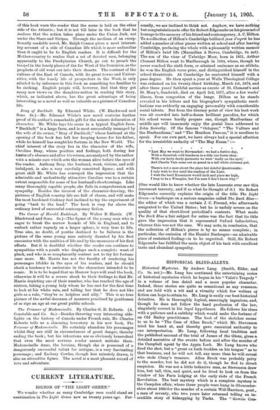HILTON OF "THE LIGHT GREEN."
sonally, we are inclined to think not. Anyhow, we have nothing but congratulations to offer Sir Robert Edgcumbe on his pions act of homage to the memory of his friend and contemporary, A. C.Hilton. To a collection of Hilton's Cambridge brilliant jet= d'esprit he has added a number of other pieces written at school and after leaving Cambridge, prefacing the whole with a pleasantly written memoir of Hilton's brief life (Macmillan & Bowes, Cambridge, 5s. net). The son of the vicar of Uxbridge Moor, born in 18M, Arthur Clement Hilton went to Marlborough in 1864, where, though he never reached the sixth form, or attained eminence as an athlete, he won the English verse prize, and distinguished himself in the school theatricals. At Cambridge he contented himself with a pass degree. He then spent a year at Wells! Theological College was ordained on his twenty-third birthday, March 1st, 1874, and after three years' faithful service as curate of St. Clement's and St. Mary's, Sandwich, died on April 3rd, 1877, after a few weeks' illness, from congestion of the lungs. Hilton as he stands revealed in his letters and his biographer's sympathetic recol- lections was evidently an engaging personality with considerable social talents. But from the literary point of view his best work was all crowded into half-a-dozen brilliant parodies, for which his school verses hardly prepare one, though Marlburians of middle age will immensely enjoy the genial lines addressed to John Sowerby. Of the famous "Octopus," "The "Vulture and the Husbandman," and " The Heathen Pass-ee," it is needless to speak. For our own part, we have always had a special affection for the irresistible audacity of "The May Exam." :—
• • " Last May we went to Newmarket : we had a festive day,
With a decentish cold luncheon in a tidy one-horse shay.
With our lardy-dardy garments we were 'really on the spot,' And Charlie Vain came out so grand in -a tall white chimney-pot.
There's not a man about the place but doleful Questionists : I only wish to live until the reading of the Lists. I wish the hard Examiners would melt and place me high, I long to be a Wrangler, but I'm sure I don't know why."
(One would like to know whether the late Laureate ever saw this irreverent travesty, and if so what he thought of it.) Sir Robert Edgcumbe correctly explains the origin of the title The Light Green—a burlesque on a serious magazine called The Dark Blue— the editor of which was a certain J. C. Freund, who afterwards emigrated to the United States ; but he is unduly severe on the quality of that short-lived periodical's contents. What made The Dark Blue a fair subject for satire was the fact that its title gave the impression that it represented Oxford belles-lettres,
whereas this was not the case. We may note, in conclusion, that the collection of Hilton's pieces is by no means complete ; in particular, the omission of the Hamlet Burlesque—an admirable piece of sustained fooling—is to be regretted. Still, Sir Robert Edgcumbe has fulfilled the main object of his task with excellent taste and abundant sympathy.






































 Previous page
Previous page